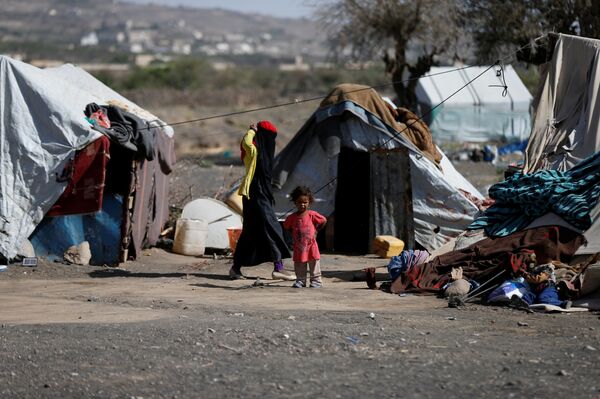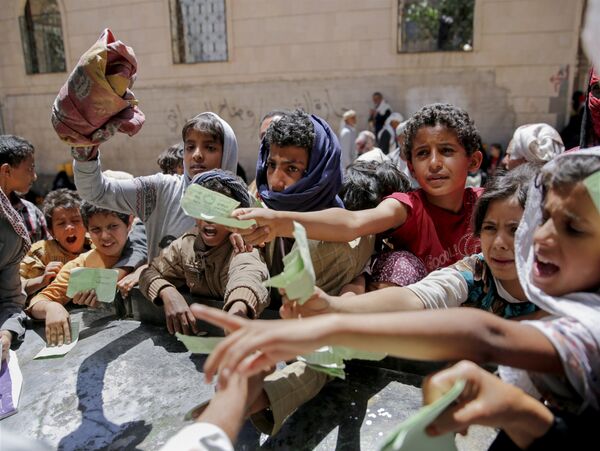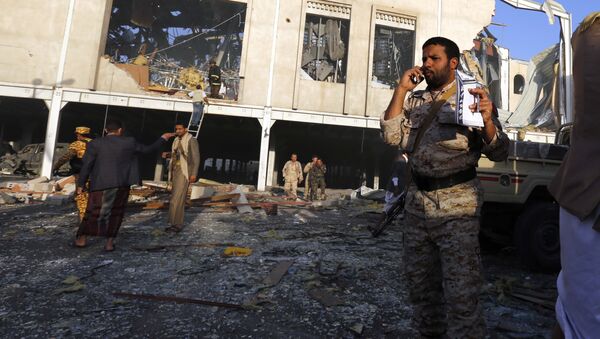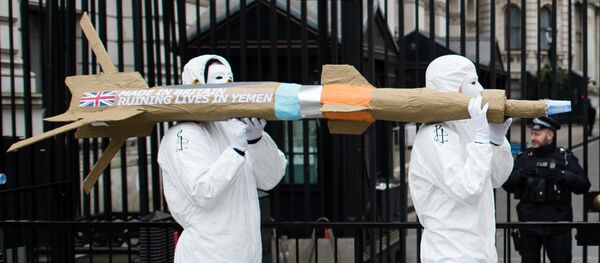In the wake of the attack, Trade Secretary Liam Fox delayed signing a set of Saudi Arabian export licences, and readied officials for arms exports to Riyadh to be suspended outright.
However, Foreign Secretary Boris Johnson advised Mr. Fox the sales should continue, as he judged there was no clear risk British weapons would be used for serious breaches of international humanitarian law, despite high and rising evidence of Saudi Arabia's indiscriminate bombing of civilians in the conflict.
Hearing about bombing of 34 schools in Yemen since war started in 2015 and bad cholera outbreak #stopDSEI pic.twitter.com/iCShYBL8dx
— London CAAT (@londoncaat) July 22, 2017
Over the next six months, according to Campaign Against Arms Trade data, the government authorized a wealth of exports, including US$343 billion in combat aircraft components to the Saudi air force, and US$5 million of bombs and missiles.
Details of export licences to Saudi Arabia for military and dual-use goods controlled by the UK governm… https://t.co/lpwFPrI1Fn via @CAATuk
— Luciano (@JoongWu) July 24, 2017
While a significant reduction from US$1.3 billion of bombs and missiles sent to the country over the course of summer 2015 alone, for campaigners the sales remain a matter of grave concern.
Moreover, the US$370 billion total does not include aircraft cannon equipment, targeting software, aircraft components, assault rifles and more exported under 24 open licences, in which the value of the purchased equipment is not recorded. The total likely underestimates the true figure in any event, as standard individual export licences, which apply to specific sets being exported, are highly opaque.

Andrew Smith, a CAAT spokesperson, says the UK's willingness to maintain exports despite the extensive documentation attesting to Saudi war crimes in Yemen, and the humanitarian crisis ravaging the country as a result, was a clear demonstration the UK's relationship with Saudi Arabia was uncritical.
"The arms trade is fueled by war and conflict, and the threat of war and conflict. Weapons fuel wars and encourage wars — if world peace broke out tomorrow, the arms trade would go out of business. There can't be an ethical arms trade when the end result is going to be escalation. Arms traders don't care where weapons go, they just want to sell as many as possible," Mr. Smith told Sputnik.
Mr. Smith notes the consequences of these sales can be devastating, as it is UK-made fighter jets that are dropping UK-made bombs on Yemen. While arms sales are often defended by the UK government on an economic basis, he is not moved by them.

"The government recently released a report listing 30 countries where the UK is concerned about the state of human rights and democracy — yet, in the last 12 months, the government has licensed arms to two thirds of them.
Human rights matter. Read what the FCO is doing to protect & promote #HumanRights in our latest #HRDReport: 📝 https://t.co/NxLu8N3oK8 pic.twitter.com/8T8NXyPTmT
— Human Rights at FCO (@FCOHumanRights) July 20, 2017
"There's a huge amount of hypocrisy in what the UK says, and what the UK does," Mr. Smith added.
In February, CAAT spearheaded a High Court judicial review of the UK's arms exports to Saudi Arabia.
The government argued it operated one of the most robust export control regimes in the world, and rigorously examined every purchase application on a case-by-case basis against international export-licensing criteria, and licenses were suspended or revoked in response to "changing facts" on battlegrounds.
Judges ruled in favor of the government, reasoning it had access to senior Saudi officials and sufficient data on the conflict to allow it to be confident there was no clear risk UK weapons might be used to commit atrocities.
CAAT is appealing the decision.





